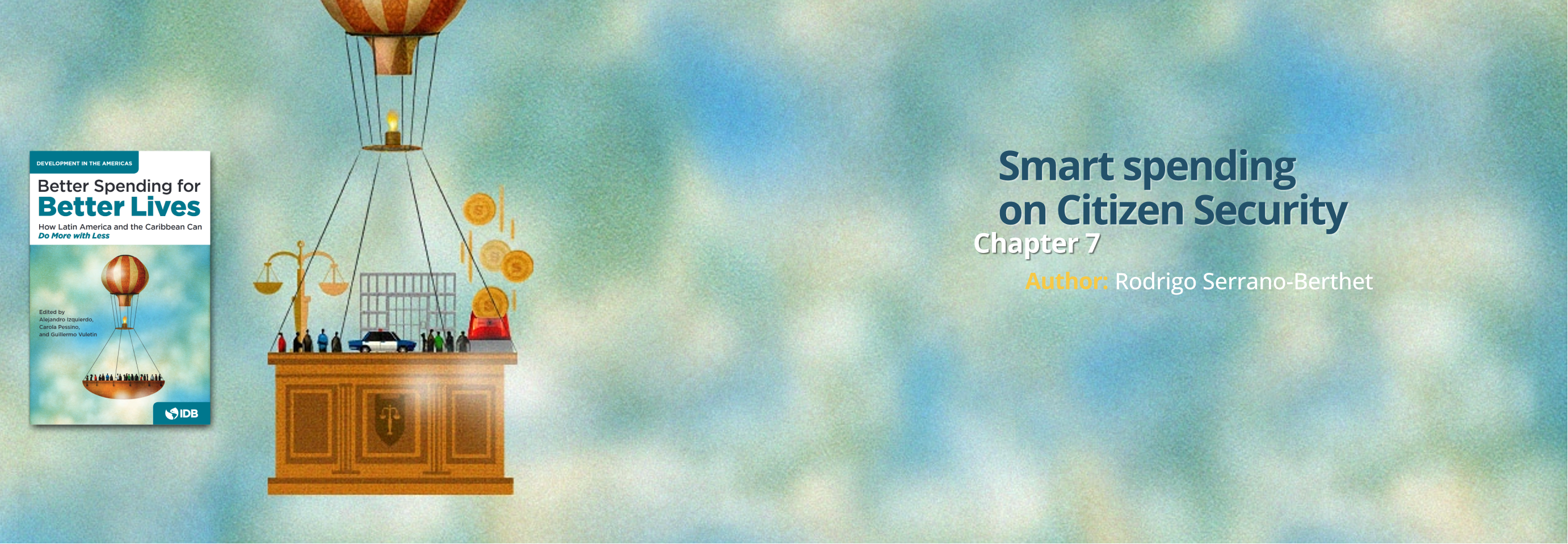Text by: Rodrigo Serrano-Berthet*
I would like to start this text with a statement that may sound a little controversial:
In general, Latin American and Caribbean citizen security and justice decision-makers have not shown much interest in whether or not their policies work for preventing and reducing crime, violence, and the insecurity that plague the region.
I'm not saying that they're not interested, but that they haven't demonstrated that kind of concern. If crime goes down, it's due to the policies they implemented. If crime goes up, it's because of factors beyond their control. The opposition argues the exact opposite. The quality of the public debate on the effectiveness of citizen security policies often does not go much beyond this level of sophistication. And, as a consequence, in most cases we don't know if our interventions have any actual impact on reducing crime. I'm talking about the average, of course; there will always be exceptions.
There are several reasons that help us understanding this situation, but before I go into this topic I'd like to explain what I'm basing this statement on.
How to measure government interest in the effectiveness of security and justice programs?
While refraining from being exhaustive, I propose three basic ways of measuring what would be desirable to find in our region.
1) Impact assessments (quantity, quality, funding, use)
If there was an actual interest in effectiveness, the region would have thousands of studies evaluating whether it was possible to attribute to "program x", or to "measure z", any effect on theft, gender violence or whatever the initiative sought to impact. A significant percentage of these studies would be of high scientific rigor in terms of causal inference, and a high proportion of them would have had government support. Over time, we would observe that the programs that worked were scaled up and those that didn't work were phased out.
That would be ideal. Now, let's look at the reality.
To create the Evidence Bank, the IDB did an exhaustive survey of existing impact assessments in the region. So far, we have found around 200 studies, of which around 60 meet the criteria of scientific rigor to infer causality.;
This is not a negligible number, but small, in my opinion, if we consider that the region has 33 countries that have been implementing all kinds of citizen security programs at the national level, as well as thousands of sub-national governments, over the past 20 years or so. Of the studies we found, only a minority were funded directly or indirectly by the region's governments.
2) Evidence-informed program design
If there was a real interest in effectiveness, every time a new program had to be designed or a new policy decision made, the decision-maker would have sought to be informed by the best available scientific evidence about the causes of the problem that they wanted to tackle, as well as about the solutions that have been shown to be effective in solving that problem.
Now, let's look at the reality.
A few years ago we did a study which, though partial and imperfect, still gives us some clues. While taking into account six countries in the region, we analyzed the design of 283 citizen security programs, and found that only 8% of these included information on the evidence of effectiveness of the type of intervention being proposed.

Access the full study here.
3) Organizational learning capacities (Criminal Analysis Units)
If there was a real interest in effectiveness, citizen security and justice institutions (police agencies, prosecutors' offices, etc.) would have robust Criminal Analysis Units, equipped with the capacity to analyse the patterns and causes of the problems they seek to solve, as well as to test solutions and measure the efficiency and effectiveness of alternative solutions in a real-time manner.
I am not aware of any studies on this, but based on the experience of the IDB's citizen security team, we can say that although Analysis Units are growing in number in LAC, they are generally disconnected from the decision-making process. The focus of existing units is largely on producing descriptive statistical reports, and in very few cases are there analytical products aimed at supporting senior management decisions, let alone measuring the effectiveness of the decisions made.
Which barriers hinder interest in effectiveness in security and justice?
In another blog, I wondered why security and justice policies in our region "have been guided less by science and more by beliefs", while prioritizing "copies of what seems popular, or what gives the most political returns, thus giving free space to ideologies and prejudices of all kinds".
I have already focused on one of the barriers: the difficulty decision-makers have in accessing science, and systematized knowledge about what has worked and what has not. The Evidence Bank aims to contribute to closing this access gap.
However, this is neither the only barrier nor the most important one.
The most important barrier explaining the lack of interest in effectiveness we see in LAC is the low importance given to crime prevention in security and justice policies.
The "disadvantages" of prevention
The citizen security and justice system has two main functions: law enforcement and crime prevention. Of these two functions, law enforcement is the easiest and most natural to carry out, and therefore the one that usually concentrates the bulk of the energy of the security and justice institutions. Law enforcement agencies in the region, for example, devote most of their time to reactive crime responses, such as dispatching services related to emergency calls, arrests, or criminal investigations.
Defining an agency's institutional mission around these control activities has several advantages, as it allows the police agency to meet the most immediate demands of citizens, the requests for visible action from politicians, and to do so without having to depend on anyone else other than the organization itself to achieve its objective. This gives way to an "argument" in favor of ignoring questions related to the effectiveness of these actions in reducing crime. An arrest, an emergency call answered, or a criminal investigation completed, have intrinsic value and are an essential part of the police mission.
And why is it "good" not to have to answer questions about the effectiveness of crime prevention? As prevention is difficult, it can take time, and it does not necessarily generate visible actions, as well as it requires the cooperation of others. And the risk of failure is higher.
I'm talking about prevention taken seriously, not just putting more police resources on patrols or visiting schools to give presentations on drug prevention, while assuming that they will be effective. Prevention, when taken seriously, requires questioning effectiveness, while "law enforcement" can justify itself on the basis of efficiency measures.
The problem is that in order to know whether an activity has had a positive preventive effect, some kind of impact assessment is needed. It's not enough to show the number of activities carried out or products generated. Moreover, these impact assessments carry a high risk for the organization: showing that what they have done has not prevented crime or, worse, that they have left society with more problems than before.
In short, the social value of law enforcement can be measured through the "products" that are generated under the strict control of police agencies. On the other hand, the social value of prevention can only be measured through "results" which, as a rule, are outside the control of the police.
So, as an organization, why would I seriously care about prevention if I'm much more confident and comfortable sticking to my "law enforcement" duties?
The social value of prevention
The main reason for this is that any citizen would a thousand times rather not be the victim of a crime than have their emergency call answered, or the criminal responsible for the crime arrested or investigated. From the standpoint of the value to society, reducing and preventing crime is much more important than reacting to it.
The most modern police forces in the world have already understood this and give prevention a central role in their work. They approach each of their tasks (including control) with a preventive logic. This obviously includes the deployment of police forces in the territory, which can have a zero percent effect on crime prevention (if done badly) or generate between 30% and 40% reduction, if strategies such as hot spot policing are adopted.
However, within these institutions even their repressive work is predominated by a preventive perspective. As such, instead of reactly investigating crimes on a case by case manner, they analyze criminal patterns, identify underlying common causes, define what the police should do and act proactively on these causes.
Making this change requires leaving one's comfort zone and moving passed the reactive model to start asking the question of what is the most effective way of achieving the most socially valuable results.
To do this, we need to make prevention more attractive to police organizations by helping making citizens value it and demand it, as well as by helping politicians see the advantages of promoting it. At the same time, we need police agencies that are less afraid of failure, and that become organizations driven by continuous learning and by the search for results.
And what we say applies not only to the police, but also to the other organizations in the criminal justice system.
Getting security and justice organizations to identify prevention as a central focus of their work, to have the institutional courage to do so, is probably the most important goal that those of us who seek to increase the effectiveness of public policies within those fields can have.
Through the Evidence-Based Platform we seek, modestly, to help in this paradigm shift by disseminating preventive models that have worked and criticizing those that have not (but remain popular), as well as by strengthening the emerging community of practice of political leaders, citizen security professionals, academics and activists committed to the effectiveness of prevention and development efforts.
Write to us to let us know what you think about these issues, what is being done and what more could be done to increase policymakers' interest in crime prevention and evidence-based policies.
* Rodrigo Serrano-Berthet is the lead specialist in citizen security and justice in the IDB.
